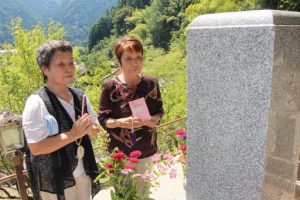Before graves of acquaintances with certificates in hand, plaintiffs urge government to quickly provide support to all “black rain” victims
Aug. 7, 2021
Vow to continue demand that was begun more than 40 years ago
by Teru Matsumoto and Yuichi Yamasaki, Staff Writers
This year’s was the first commemoration of the atomic bombing of Hiroshima since plaintiffs declared victory in a lawsuit in late July after Japan’s national government decided to not make a legal appeal of the court ruling related to “black rain” that had fallen on Hiroshima after the bombing of that city. Continuing their pleas for relief measures while enduring both mental and physical suffering caused by the black rain, the plaintiffs took the occasion at the Hiroshima Peace Memorial Ceremony, held in the city’s Naka Ward, and at other venues on August 6 to remember family members and friends who had died before witnessing the court decision. They were filled with the earnest desire for the government to quickly recognize other black rain victims as being A-bomb survivors.
The cover of the new Atomic Bomb Survivor’s Certificate some of the plaintiffs brought with them to a gravesite shone in the reflected sunlight.
On the same day, Chika Maeda, 79, a resident of Naka Ward, and Chizora Nishimura, 77, who lives in Hiroshima’s Asaminami Ward, visited their father’s grave in the town of Akiota-cho’s Kake area in Hiroshima Prefecture, about 20 kilometers from the hypocenter. Hyoso Hamamoto, the sisters’ father, died in 2007 at the age of 93. They also stopped before the nearby grave of Masayuki Matsumoto and placed their hands together in prayer. Mr. Matsumoto was the deputy chief of the plaintiff group but died in March 2020 at the age of 94.
After the war, Mr. Hamamoto and Mr. Matsumoto busily engaged in collecting testimonies from residents who had been exposed to black rain. As founders of an association of black rain victims that had been established in November 1978, they made every effort to expand the black rain area covered by the national relief law, vowing that they could not die until “our claim is granted.” The sisters expressed their gratitude to the two men and renewed their resolve. “It’s thanks to our father and Mr. Matsumoto that we have been recognized as being A-bomb survivors. We will live our lives fully for those who were unable to experience the court decision.”
On July 14, the Hiroshima High Court upheld the District Court’s decision recognizing that black rain had fallen in a broader area than the current area of eligibility for relief as determined by the Japanese national government, ordering the government to certify all the plaintiffs as being A-bomb survivors and to issue them survivor certificates. The case was finalized in favor of the plaintiffs after Japan’s Prime Minister Yoshihide Suga announced his decision to not appeal the decision to the nation’s Supreme Court before the appeal deadline expired.
During the six-year legal battle, 19 plaintiffs, including Mr. Matsumoto, died. “I wanted to share my joy with her,” Takeko Kusaka, 78, who lives in Hiroshima’s Saeki Ward, said of Kiyoko Sumikawa, her close friend of 30 years who was listed as one of the plaintiffs but died in July 2019 at the age of 84. “Still, I have been able to live to this day. I have to continue teaching the next generations about black rain. I’m sure Ms. Sumikawa would say the same thing,” Ms. Kusaka murmured as if encouraging herself.
The national government revealed its plan to discuss with Hiroshima’s Prefectural and City governments about revising the guidelines for recognizing others in circumstances similar to those experienced by the plaintiffs as being A-bomb survivors. However, with no timeline in sight for support, many are calling for immediate establishment of a design for such a system.
In the summer commemorating the 76th anniversary of the atomic bombing, pleas made for more than 40 years by those who were exposed to black rain shed fresh light on the spirit of the Atomic Bomb Survivors Relief Law, which stipulates that damage from the atomic bombing should be covered from the perspective of national government compensation. Masaaki Takano, 83, the lead plaintiff who lives in Saeki Ward, said, “The path to providing relief to all black rain victims has been opened. We are living witnesses.”
(Originally published on August 7, 2021)








